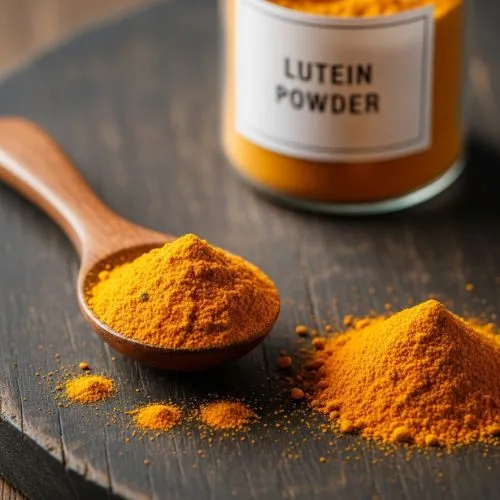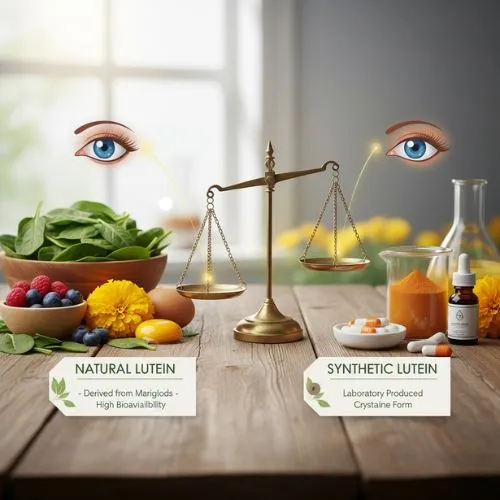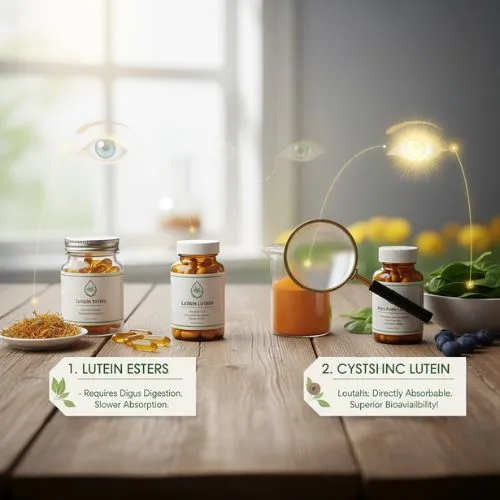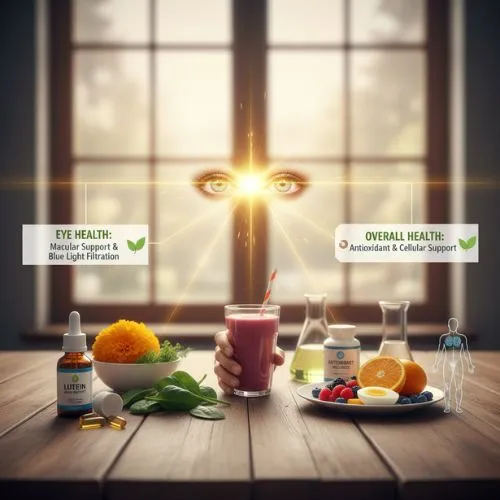What is the best form of lutein?
Lutein has become a popular supplement for eye health and overall well-being. But with various forms available, it's natural to wonder: what is the best form of lutein? This comprehensive guide will explore different lutein forms, their absorption rates, and how to choose the right option for your health needs.

Comparing Natural vs Synthetic Lutein Forms
Natural Lutein Sources
Lutein, a valuable carotenoid, is most commonly obtained from marigold flowers, which naturally provide it in high concentrations. The extract is processed into lutein powder, a widely used ingredient in dietary supplements and functional foods. Because it comes from a natural source, marigold-derived lutein is considered highly bioavailable, meaning the body can absorb and use it efficiently. It is often paired with other plant compounds, enhancing its nutritional benefits and supporting overall health.
Synthetic Lutein Production
Synthetic lutein is manufactured in laboratories using specialized chemical processes. Although it closely resembles natural lutein in molecular structure, small variations may influence how well the body absorbs and utilizes it. One advantage of synthetic forms is their lower production cost, making them more widely available. However, unlike natural sources, synthetic lutein typically lacks the complementary plant compounds that can enhance its overall effectiveness and health benefits, potentially limiting its full nutritional value.
Bioavailability Comparison
Studies have shown that natural lutein forms, especially those derived from marigold flowers, tend to have higher bioavailability compared to synthetic versions. This means the body can more easily absorb and utilize natural lutein, potentially leading to greater health benefits. The presence of other natural compounds in marigold extract may enhance lutein absorption and effectiveness.

Which Lutein Supplement Offers Best Absorption?
Esterified vs. Free Lutein
Lutein supplements come in two primary forms: esterified and free lutein. Esterified lutein is the natural form found in marigold flowers, while free lutein is created by removing the fatty acid esters. Both forms have their advantages, but research suggests that esterified lutein may offer superior stability and absorption in the body.
Factors Affecting Lutein Absorption
Lutein absorption in the body can be affected by several factors, including dietary fat intake, meal composition, and individual digestive health. Since lutein is a fat-soluble nutrient, consuming it alongside healthy fats can significantly improve its uptake. Many supplements are designed to boost bioavailability by pairing lutein with beneficial oils or incorporating advanced delivery methods, ensuring the body can more efficiently absorb and utilize this important carotenoid.
Innovative Lutein Formulations
To improve lutein absorption, some manufacturers have developed innovative formulations. These may include microencapsulation techniques, lipid-based delivery systems, or combinations with other nutrients known to enhance carotenoid absorption. These advanced forms aim to maximize the bioavailability of lutein in supplements.

Choosing Lutein for Eye and Overall Health
Dosage Considerations
The optimal dosage of lutein can vary depending on individual needs and health goals. Generally, studies have shown benefits with doses ranging from 6 to 20 mg per day. It's essential to consult with a healthcare professional to determine the right dosage for your specific situation, especially if you have existing eye conditions or are at risk for age-related macular degeneration.
Combining Lutein with Other Nutrients
Many eye health supplements combine lutein with other beneficial compounds, such as zeaxanthin, omega-3 fatty acids, and antioxidants. These combinations may offer synergistic effects, enhancing the overall benefits for eye health and vision protection. Look for supplements that provide a balanced blend of nutrients supported by scientific research.
Quality and Purity Considerations
When selecting a lutein supplement, it's crucial to choose products from reputable manufacturers that adhere to strict quality control standards. Look for supplements that have undergone third-party testing and carry certifications such as ISO, HACCP, Kosher, or Halal. These certifications can provide assurance of product quality and purity.
Lutein in Food vs. Supplements
While lutein supplements can be beneficial, obtaining nutrients from whole foods is often preferable. Lutein-rich foods include leafy green vegetables, corn, egg yolks, and orange and yellow fruits and vegetables. Incorporating these foods into your diet can provide natural lutein along with other essential nutrients and fiber.
Personalized Approach to Lutein Supplementation
The best form of lutein for you may depend on various factors, including your age, diet, lifestyle, and specific health concerns. Some individuals may benefit more from natural food sources, while others may require higher doses through supplementation. Consider working with a healthcare provider or nutritionist to develop a personalized approach to lutein intake.

Conclusion
When it comes to choosing the best form of lutein, natural sources derived from marigold flowers often provide superior bioavailability and additional health benefits. Esterified lutein supplements may offer better stability and absorption compared to free lutein forms. However, the most effective approach to lutein supplementation depends on individual needs, dietary habits, and health goals. By considering factors such as absorption, quality, and complementary nutrients, you can make an informed decision about the best lutein form for your health.
For high-quality lutein supplements derived from natural marigold extracts, consider exploring the offerings from Yangge Biotech Co., Ltd. Our company specializes in natural plant extracts for dietary supplements and functional foods, providing innovative and high-quality solutions to meet diverse health needs. To learn more about our lutein products and other natural plant extracts, please contact us at info@yanggebiotech.com.
FAQ
Q: Can we get some samples to test before purchasing?
A: Of course, we can provide free samples of 20 to 100 grams, but the shipping cost is at the customer's expense. The shipping cost can be deducted from the next order, or the samples can be sent through your courier account.
Q: Do your products have relevant certifications?
A: Yes, our products are certified for HALAL, ISO, HACCP, Kosher, and other certifications.
Q: What is the minimum order quantity (MOQ)?
A: Small batches of samples can be customized according to your requirements.
Q: Do you offer OEM and ODM services? Can the formula be customized based on our own?
A: Of course, we provide ODM and OEM services to many customers. Our product range includes softgels, capsules, tablets, sachets, granules, and private label services. Simply contact us and let us know your requirements. Our experienced R&D team can also develop new products with specific formulas.
Please contact us to design your own branded products.
Q: How do you handle quality complaints?
A: First, we have a comprehensive quality control SOP. We provide authoritative third-party inspection reports for almost all products before shipment to minimize the possibility of quality issues. Second, we have a comprehensive return and exchange procedure. If there is a genuine quality dispute, we will strictly follow the SOP.
Q: How do you ship? How long does delivery take?
A: For small orders, we typically use DHL, UPS, EMS, FedEx, or TNT. Delivery typically takes 3-7 days. We also offer air and sea freight services. We have a strong freight forwarding team and can provide you with a one-stop service, including DDP and DDU.
Q: What are your payment terms?
A: 100% prepayment, payable by T/T, Western Union, MoneyGram, or PayPal.
Q: What is the shelf life of your products?
A: 2 years with proper storage.
Q: Is the packaging environmentally friendly?
A: We attach great importance to environmental protection and are constantly improving our product packaging. Some products are packaged in recyclable paper. Packaging materials are carefully selected to ensure product safety during transportation and storage, and to minimize environmental impact. We are committed to achieving a balance between environmental friendliness and practicality in our product packaging, and to contributing to sustainable development.
References
1. Johnson, E. J. (2014). Role of lutein and zeaxanthin in visual and cognitive function throughout the lifespan. Nutrition Reviews, 72(9), 605-612.
2. Bernstein, P. S., et al. (2016). Lutein, zeaxanthin, and meso-zeaxanthin: The basic and clinical science underlying carotenoid-based nutritional interventions against ocular disease. Progress in Retinal and Eye Research, 50, 34-66.
3. Mares, J. (2016). Lutein and Zeaxanthin Isomers in Eye Health and Disease. Annual Review of Nutrition, 36, 571-602.
4. Bohn, T. (2019). Bioavailability of Non-Provitamin A Carotenoids. Current Nutrition Reports, 8(4), 331-340.
5. Ma, L., et al. (2012). Lutein and zeaxanthin intake and the risk of age-related macular degeneration: a systematic review and meta-analysis. British Journal of Nutrition, 107(3), 350-359.

Based on your location and order quantity, you will have the opportunity to receive a limited time free shipping promotion!

Who we are


